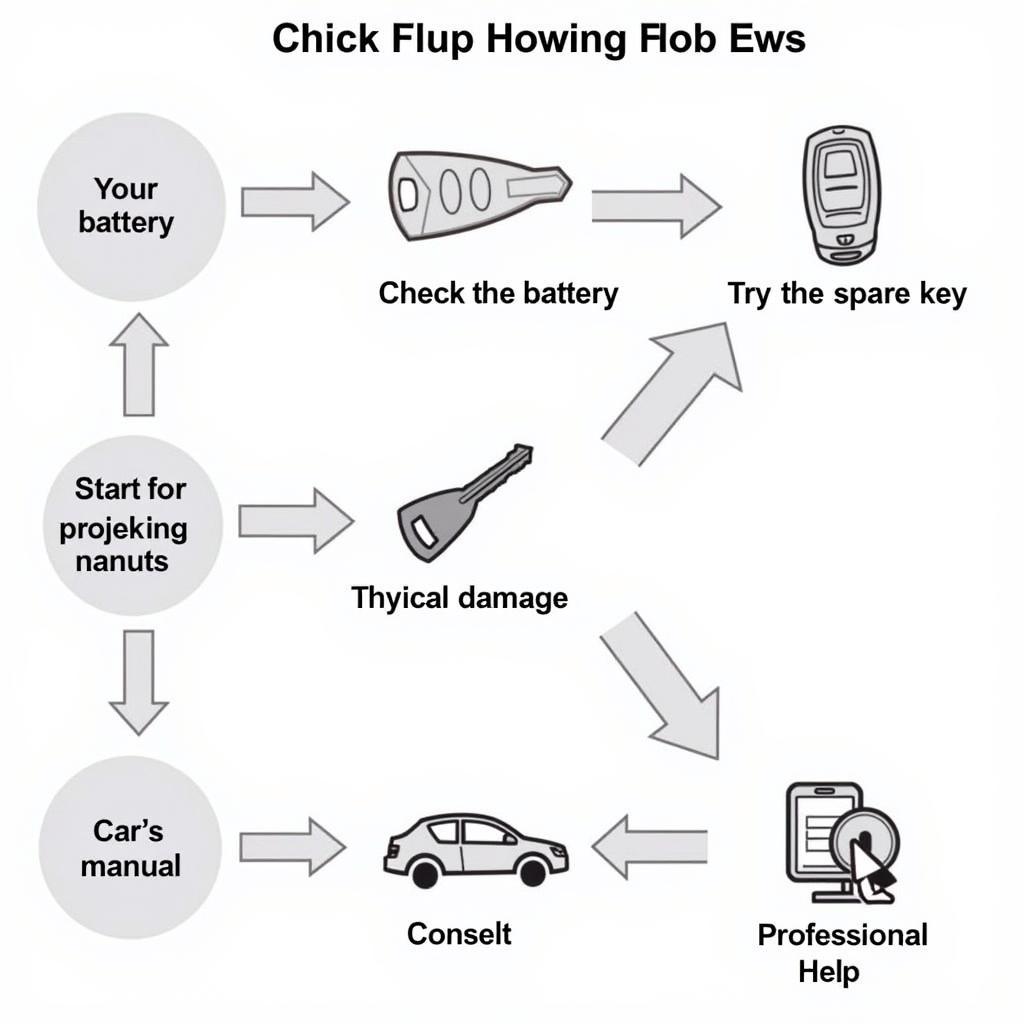A fob key isn’t just a key; it’s a sophisticated piece of technology that has revolutionized how we interact with our vehicles. Understanding what a fob key is, how it works, and its potential issues can save you time, money, and frustration. This comprehensive guide will delve into everything you need to know about fob keys, from their basic functionality to advanced diagnostics and troubleshooting.
What is a Fob Key?
A fob key, also known as a key fob, smart key, or remote key, is a small electronic device that combines the traditional metal key blade with a remote control for locking, unlocking, and starting a vehicle. Unlike traditional keys, fob keys use radio waves to communicate with your car’s systems, offering enhanced security and convenience. This wireless communication allows you to perform various actions without physically inserting the key into the ignition or door locks.
How Does a Fob Key Work?
Fob keys operate using radio frequency identification (RFID) technology. Inside the fob is a small transponder chip that emits a unique coded signal. When you press a button on the fob, such as the “unlock” button, the signal is transmitted to a receiver in your car. If the received code matches the one programmed into the car’s system, the corresponding action is performed – the doors unlock. Similarly, the same principle applies to starting the engine, activating the alarm, or opening the trunk remotely.
Different Types of Fob Keys
While the basic principle remains the same, there are several types of fob keys, each with distinct features:
- Basic Fob Key: This type offers basic functions like locking, unlocking, and panic alarm.
- Smart Key/Keyless Entry: These fobs allow you to unlock the car simply by being near it. They often have a push-button start feature, eliminating the need to insert a key into the ignition.
- Proximity Key: Similar to smart keys, proximity keys automatically unlock the car when you approach and lock it when you walk away.
- Switchblade Key: This type features a key blade that folds into the fob body for compact storage.
Common Fob Key Problems and Solutions
Fob keys, like any electronic device, can experience issues. Here’s a breakdown of some common problems and their potential solutions:
- Dead Battery: The most frequent issue is a depleted fob battery. Replacing the battery is a simple fix.
- Programming Issues: Sometimes, the fob key loses its programming and needs to be reprogrammed to your car.
- Damaged Key Fob: Physical damage to the fob, like a cracked casing or broken buttons, can impede functionality.
- Internal Component Failure: Issues with the transponder chip or other internal components might require professional repair or replacement.
- Car Receiver Problems: Occasionally, the problem might not be with the fob itself but with the receiver in your car.
Troubleshooting Your Fob Key
If your fob key isn’t working correctly, try these troubleshooting steps:
- Check the battery: Replace the battery with a new one.
- Try the spare key: If your spare key works, it indicates a problem with the original fob.
- Check for physical damage: Inspect the fob for any cracks or broken buttons.
- Consult your car’s manual: Your owner’s manual might have specific instructions for reprogramming your fob key.
- Seek professional help: If none of the above steps work, contact a qualified automotive locksmith or dealership.
 Troubleshooting Fob Key Issues
Troubleshooting Fob Key Issues
Why is Understanding Your Fob Key Important?
Understanding your fob key allows you to maintain control over your vehicle’s security and functionality. Knowing how it works and how to troubleshoot common issues empowers you to handle minor problems independently, saving you time and expense.
“A well-maintained fob key is essential for the security and convenience of modern vehicles,” says John Smith, Senior Automotive Technician at AutoTech Solutions. “Regular battery checks and prompt attention to any malfunctions can prevent unexpected lockouts and ensure your vehicle remains protected.”
Conclusion
The fob key has transformed the way we interact with our cars, offering increased convenience and security. Understanding how it works and how to address potential issues empowers you to maintain control over your vehicle’s access and operation. While fob keys are reliable, they can experience occasional problems. By following the troubleshooting steps outlined in this guide, you can often resolve minor issues yourself. However, for more complex problems, seeking professional assistance is always recommended. This knowledge ensures a smoother and more secure driving experience with your modern vehicle, minimizing the risk of unexpected lockouts and maximizing your peace of mind.
FAQ
- How often should I replace my fob key battery? Typically, every 2-3 years.
- Can I program a new fob key myself? Some cars allow self-programming, while others require professional assistance. daf lf brake wear warning
- How much does it cost to replace a lost fob key? The cost varies depending on the car make and model.
- What should I do if my fob key is stolen? Contact your dealership or an automotive locksmith immediately to have the key deactivated.
- Are there any security risks associated with fob keys? While generally secure, fob keys can be susceptible to relay attacks, so additional security measures are recommended.
- Can I use my fob key to remotely start my car? Many modern fob keys offer remote start functionality.
- What is the difference between a fob key and a transponder key? A transponder key has a chip but lacks the remote control functions of a fob key.


